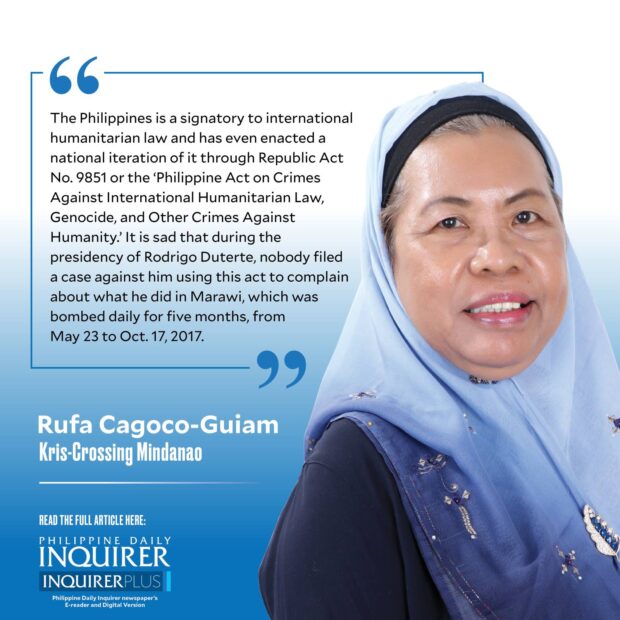On collective punishment

The issue of collective punishment has come to worldwide attention in the wake of Israel’s massive use of force in bombing different parts of one of the densely populated areas in Gaza. This was in response to the Oct. 7 attack of the militant group Hamas on Israeli territory.
Several news anchors on international news networks have discussed this at length not only with Palestinian security experts and other scholars and activists working toward creating a more peaceful environment in the Gaza Strip, where millions of Palestinians reside. They invariably cited Article 33 of the Geneva Convention of 1949 and international humanitarian law (IHL) that provides stringent sanctions on imposing collective punishment or penalties or reprisals vis-à-vis individual responsibilities of perpetrators. Article 33 explicitly provides the prohibition of extracting collective penalties, thus: “No protected person may be punished for an offense he or she has not personally committed. Collective penalties and likewise all measures of intimidation or of terrorism are prohibited.” Collective penalties include reprisals against the communities perceived to be part of the group that perpetrated some terrorist acts, and in this case in the Gaza war, it is the Palestinian militant group, Hamas. Article 33 also prohibits pillage of such communities, even if they share the same identity as the perpetrators. The crime of one group is not the crime of the entire community they belong to.
The Philippines is a signatory to the IHL and has even enacted a national iteration of it through Republic Act No. 9851 or the “Philippine Act on Crimes Against International Humanitarian Law, Genocide, and Other Crimes Against Humanity.” The Philippine Congress passed it on July 27, 2009, and was signed into law on Dec. 11, 2009, by then President Gloria Macapagal Arroyo.
It is sad that during the presidency of Rodrigo Duterte, nobody filed a case against him using this act to complain about what he did in Marawi, which was bombed daily for five months, from May 23 to Oct. 17, 2017.
The main culprit in the Marawi Siege was the renegade Maute group, composed of the brothers Maute, their parents, and some followers, including close relatives from the municipality of Butig, in Lanao del Sur. Yet more than 200 hectares, home to residents of 26 barangays in Marawi City, were razed to the ground largely through the use of massive firearms of destruction that are only available for use by the Philippine military forces. The pillage of the residences of more than 2,000 Meranaws happened because of this decision to “carpet bomb” Marawi, per orders of Duterte, then the president and commander in chief of the Philippine Armed Forces.
Over the weekend, social media was abuzz with the damning tweet of Ambassador Teddy Locsin where he claimed to have responded satirically to someone’s post on X, formerly Twitter, where he partly wrote: “That’s why Palestinian children should be killed; they might grow up to be gullible as innocent Palestinians letting Hamas launch rockets at Israel, not that they can stop them, but that’s no excuse. They are Muslims. They could stage mass suicide attacks against Hamas until the latter ran out of bullets …”
His tweet has been deleted after getting a huge outcry from other X users, prompting Lanao del Sur Rep. Zia Alonto Adiong to respond to Locsin’s tweet, telling the former that he should know better as an ambassador and a representative of the Filipino people. Locsin then posted an apologetic remark saying it was meant to be satirical, and not to cause the “literal death” of anyone.
His short tweet message is full of overgeneralizations, typical of a bigoted attitude toward Palestinians and toward Muslims as a whole. First, as Adiong pointed out in his letter, not all Palestinians are Muslims. Second, making something gruesome like killing children shows genocidal tendencies quite unbecoming of a highly placed official like he is. His argument that children can become like other “gullible Palestinians” also resonates with the despotic line of Duterte when he once had an audience with Israeli Prime Minister Benjamin Netanyahu. He said that if he were Netanyahu, he would pulverize Gaza and make it the “biggest cemetery in the world.”
Being highly educated and placed in high positions of influence and power does not equate to being rational and humane, as proven by Locsin’s comment pushing for the punishment of innocent children so that they will not grow up to allow terrorists to thrive. His comments are also expressions of his seeming ignorance of the law on collective punishment, both internationally and our Philippine version of it, RA 9851.
—————-
Comments to rcguiam@gmail.com




















